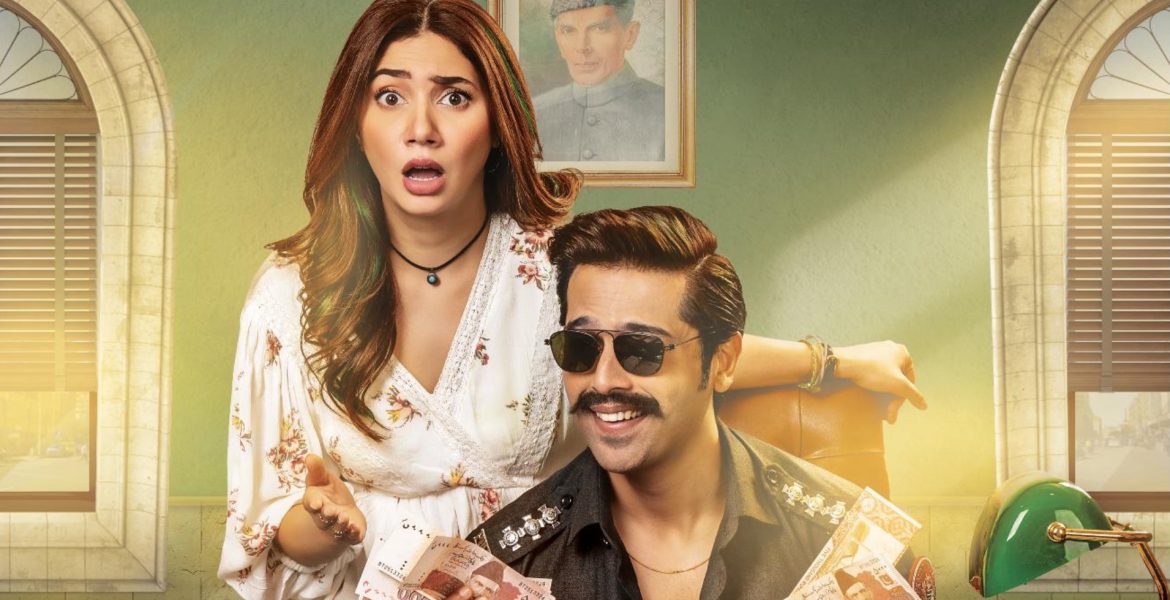Films with heart-stopping action are often considered to be top-notch choices to watch for just about anybody expecting to be entertained thoroughly over the Eid holidays. Nabeel Qureshi and Fizza Ali Meerza’s latest offering, Quaid-e-Azam Zindabad also comes from the same concept, bringing a bad cop turning good story to the forefront with the expectation that fans will love it for all the power-packed dramatic moments.
But what all ensues? Diva explores…
***Spoilers Ahead***
The Story
Starring Fahad Mustafa and Mahira Khan in lead roles with Qavi Khan and Jawed Sheikh playing pivotal characters, the film narrates the story of Gulab, a corrupt police officer, who chooses the darker side despite his father – a clean-record cop – teaching him to steer clear of vices with an anecdote claiming that Quaid-e-Azam’s face is on the banknote so that he watches them every time they choose to take a bribe.
The film comically explores his exploits and his growth within the police force, as he becomes a right-hand man for the country’s corrupt elite and politicians who use him as a henchman when needed. Amidst all of this, we see him lying to his now-retired father as he portrays humility and honesty in front of him, claiming to have adhered to a life of loyalty to the country and its citizens – all the while cooping-up hordes of cash around his house.
On the other side, Gulab’s story connects with Jiya’s (Mahira Khan), who is an animal rights activist with a heart of gold. There are scenes showcasing her unconditional love for critters and pets of all kinds, for whom she even trails on the edges of buildings. That’s where the two meet and the story turns into one of romance as well, although more from Gulab than Jiya.
The film continues on its rather predictable path and we see Jiya slowly turning into a positive force for Gulab as he woos her. However, things take an unfortunate turn when his father finds out about how corrupt his son actually is. What happens next, is what the film completely is about.
Remember the father’s anecdote? That is what makes the film take a 180-degree turn towards a roller-coaster ride of emotions and hilarity as the morally-corrupt unite to find ways to salvage their money and Gulab, finds a silver lining towards being a better human being.
The Lows
In its 2 hours and 20-minute runtime, the film tends to feel elongated for no reason at times. The first half for example, drags beyond measure with a tinge of being preachy. The second half, on the other hand, remains fast-paced, and retains most of the film’s entertaining sections that help keep the film afloat. It would have done QAZ good if the plot structures were designed to build the action on a continuous growth rather than having lulls in the middle.
The film’s editing too, is a total let-down. The film feels shoddy at moments, where scenes tend not to feel connected to each other – a thing other filmmakers are often forgiven for, but not the duo of Nabeel Qureshi and Fizza Ali Meerza, whose previous films have proven their promise for perfection. There could definitely have been more focus on ensuring colour-grading and sound-design issues should not pop up.
Additional to the technical faults, the underusage of a talent like Mahira Khan proves to be an unfortunate situation as well. While, Mahira herself, has gone on record to say it’s purely a Fahad Mustafa film, one would have expected to have her given more screentime than for her just to be a prop to move the story forward. Unfortunately, it’s a completely missed opportunity.
The Highs
In a film struggling with a number of lows, its highs come in few and far between. But, we’re glad at least, they do. One such example is the chemistry between Fahad Mustafa and Mahira Khan, despite the latter finding much less screentime in the film. The pair looks fresh on the silver screen and definitely harness each other’s energies. One wouldn’t mind seeing more of them together in the future.
Apart from the lead duo, the chemistry seen between Mustafa and Jawed Sheikh too is worth mentioning. We’ve been seeing the two working together in almost all of Nabeel and Fizza’s films, and they haven ow perfected their dynamics with each other. It proved to be a much-needed comic relief in QAZ as well, like most of their films.
Lastly, one of the most important highs of the film has to be its story. Despite films on corruption being a topic explored through many different tangents across the globe, QAZ does not take the hackneyed approach. The story is fresh and the execution is remarkable. It is poignant at times, but hilarious at others, making this an apt reflection of what Pakistani society seems to be going through at the moment, or rather all through its seventy-five-year history.
The Conclusion
All in all, Quaid-e-Azam Zindabad is an attempt towards making yet another hit Nabeel & Fizza film. However, unlike their previous ones, this one suffers from a number of ailments to make it a complete masterpiece. It does however, still work as a good one-time-watch, especially to see Fahad Mustafa and Mahira Khan work together for the first time. Give it a try this Eid-ul-Azha, and you might just like it!
Diva Rating: 3 out of 5 Stars

